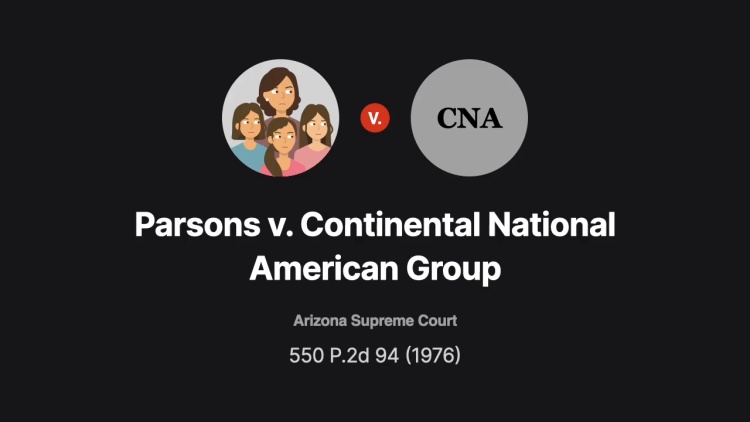Parsons v. Continental National American Group
Arizona Supreme Court
550 P.2d 94 (1976)
- Written by Genan Zilkha, JD
Facts
Michael Smithey assaulted his neighbors, Ruth, Dawn, and Gail Parsons (plaintiffs). Smithey’s parents had an insurance policy with Continental National American Group (CNA) (defendant). This policy contained an exclusion that excluded liability for injuries caused by an intentional act. The plaintiffs filed a tort action against Smithey and his parents alleging that Smithey had assaulted the plaintiffs and that his parents were negligent because they had failed to restrain him. CNA’s retained counsel, who was handling Smithey’s and his parents’ defenses, obtained Smithey’s file. This attorney told CNA that he believed, based on his reading of the file, that Smithey had deliberately committed the assaults against the plaintiffs. CNA sent a letter to Smithey’s parents notifying them that CNA would investigate and defend against the plaintiffs’ claim but that CNA did not waive its rights under the policy because intentional acts were excluded under the policy. The CNA attorney interviewed Smithey. The attorney then told CNA that, based on this interview, Smithey made it obvious that his acts were willful and criminal. A trial was held, and a $50,000 judgment was entered against Smithey. The plaintiffs filed a garnishment action against CNA. CNA defended the garnishment action successfully because, it claimed, coverage for damages resulting from Smithey’s assault were excluded under the intentional-act exclusion. The same law firm that defended Smithey at the tort trial also defended CNA in the garnishment. The trial court entered a judgment in favor of CNA. The plaintiffs appealed. The appeals court reversed the trial court’s judgment. The Supreme Court of Arizona accepted a petition for review.
Rule of Law
Issue
Holding and Reasoning (Gordon, J.)
What to do next…
Here's why 907,000 law students have relied on our case briefs:
- Written by law professors and practitioners, not other law students. 47,100 briefs, keyed to 996 casebooks. Top-notch customer support.
- The right amount of information, includes the facts, issues, rule of law, holding and reasoning, and any concurrences and dissents.
- Access in your classes, works on your mobile and tablet. Massive library of related video lessons and high quality multiple-choice questions.
- Easy to use, uniform format for every case brief. Written in plain English, not in legalese. Our briefs summarize and simplify; they don’t just repeat the court’s language.





